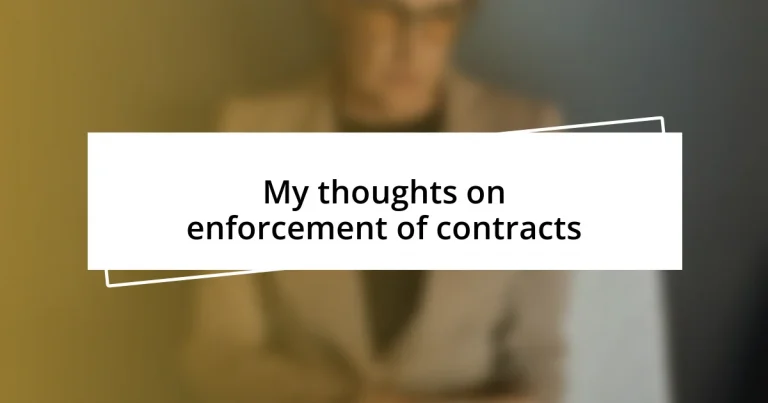Key takeaways:
- Clear and well-defined contract terms are essential to prevent disputes and maintain trust in relationships.
- Legal remedies for contract breaches include damages, specific performance, and rescission, each with unique implications for the parties involved.
- Emerging trends in contract enforcement, such as AI and blockchain technology, aim to enhance compliance and facilitate dispute resolution.
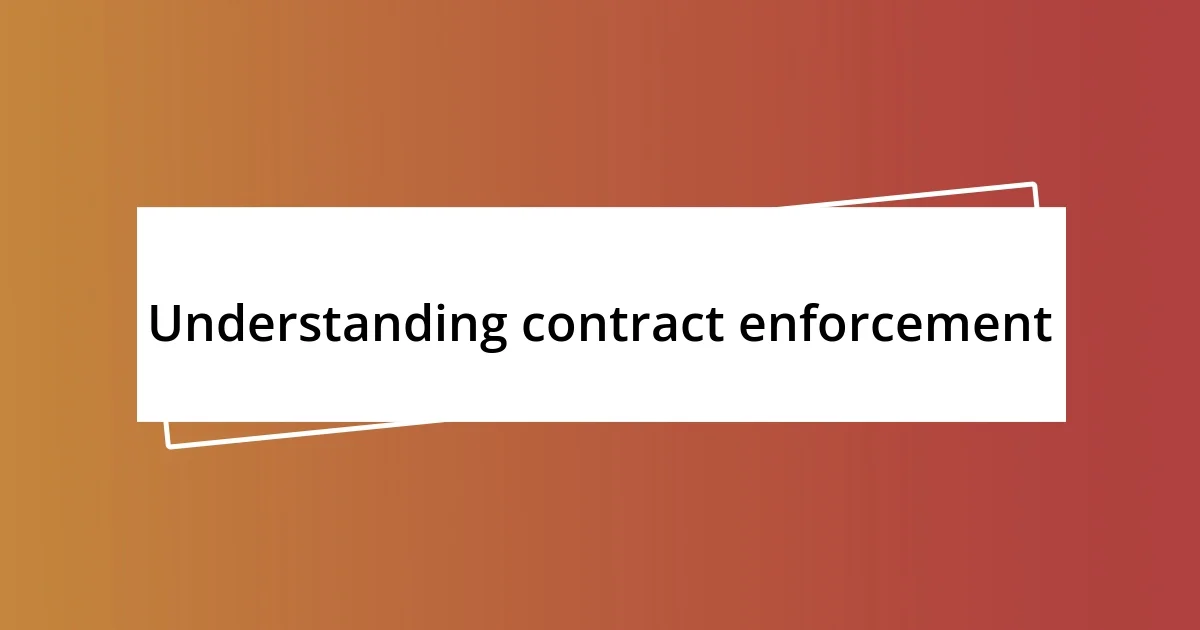
Understanding contract enforcement
When I think about contract enforcement, I realize it’s more than just a legal obligation—it’s a promise that binds parties together. Have you ever had a deal fall through due to someone not holding up their end? It can be frustrating and can leave a lasting impact on trust.
Enforcement is about ensuring that agreements are honored, but the process can vary widely depending on the jurisdiction. For instance, I once witnessed a small business struggle to get paid for services rendered because the contractual language was ambiguous. Those kinds of experiences often highlight just how crucial it is to have clear, well-defined terms in any agreement.
The emotional side of contract enforcement fascinates me too. I’ve seen relationships unravel not just because of financial disputes but because parties felt disrespected or ignored. Isn’t it interesting how contracts, which are often viewed as mere legal documents, can heavily influence personal and professional relationships? Understanding this dynamic can lead to more mindful negotiation and partnership-building in the future.
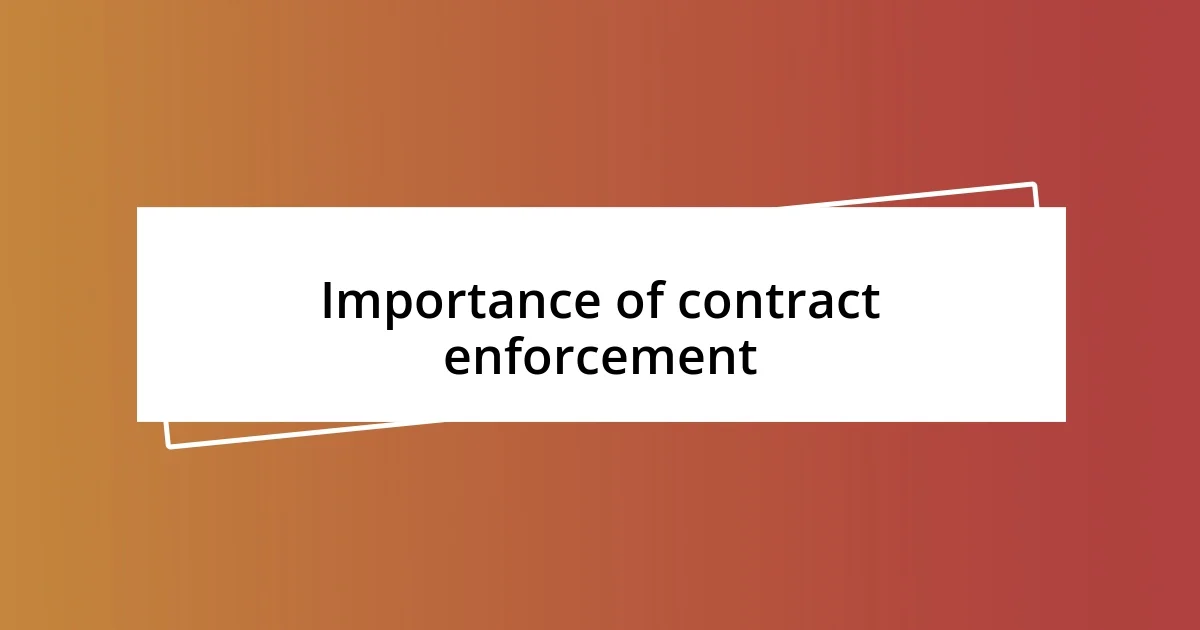
Importance of contract enforcement
Enforcement of contracts is pivotal for maintaining trust and reliability in both personal and professional relationships. I’ve seen firsthand how a failure to enforce agreements can lead to not only financial losses but also a fracture in relationships. A friend of mine once lent a substantial amount to a colleague based on a verbal agreement. When the colleague didn’t repay, what started as a financial issue quickly turned into a rift that ended their friendship. Such scenarios underscore that when contracts aren’t enforced, the results extend far beyond monetary concerns.
- Ensures accountability between parties, fostering a sense of reliability.
- Protects interests and investments, allowing parties to make informed decisions.
- Minimizes disputes by providing a clear framework for resolution.
- Builds confidence in business transactions, encouraging collaborations and partnerships.
- Creates a more stable economic environment by upholding legal agreements universally.
In my experience, having a robust enforcement mechanism doesn’t only benefit the parties involved—it nurtures a culture of respect and trust that can enhance entire industries. When people know that agreements will be honored, they’re more likely to engage openly and invest in their partnerships.
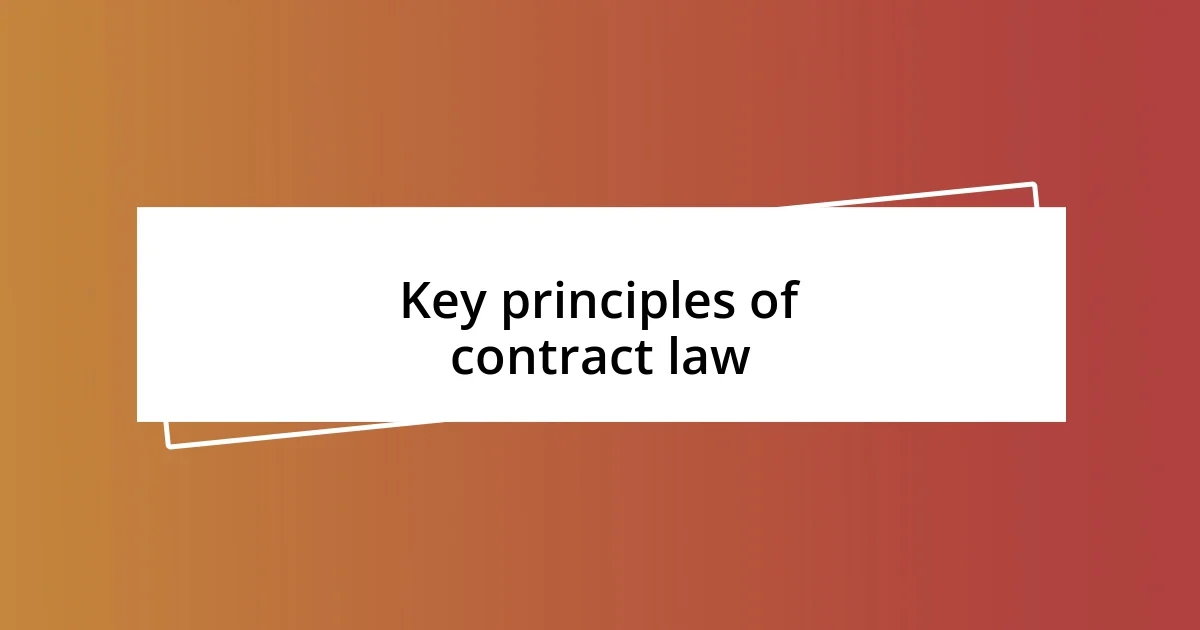
Key principles of contract law
The key principles of contract law serve as the foundation for how agreements are formed and enforced. At its core, the principle of mutual assent is essential; this means both parties must genuinely agree on the contract’s terms. I recall a project I worked on where we had extensive discussions to ensure that everyone was on the same page. This clarity not only protected us legally but also fostered a spirit of collaboration.
Consider the concept of consideration, which refers to something of value exchanged between the parties. Without this, a contract may not hold up in court. In one instance, I helped a friend navigate a situation where one party attempted to back out after a service was provided but failed to offer any consideration in return. It was a stark reminder that every party involved must give and receive something for the agreement to be enforceable.
Another principle worth mentioning is the legality of purpose, meaning the contract must adhere to public policy and not involve illegal activities. I find it interesting how this principle can sometimes intertwine with ethics. Reflecting on a business partnership gone wrong because the intended actions were questionable, it makes me appreciate the importance of both legal and ethical compliance in any agreement. The balance between legality and morality can shape the longevity and integrity of any contract.
| Key Principle | Description |
|---|---|
| Mutual Assent | Bilateral agreement where parties openly accept terms. |
| Consideration | Value exchanged between parties for the contract to be enforceable. |
| Legality of Purpose | Contracts must comply with law and public policy. |
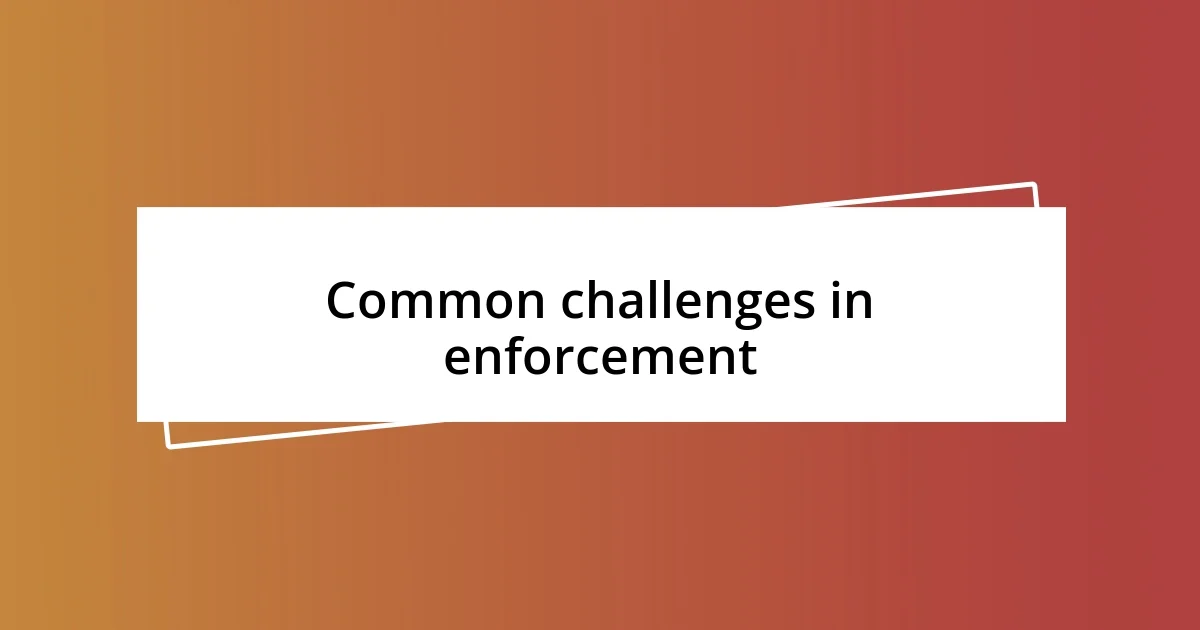
Common challenges in enforcement
One of the most significant challenges in contract enforcement is the ambiguity in contract terms. I remember a time when I was involved in negotiating a freelance project. The scope of work was vaguely defined, which later caused a huge dispute. When a disagreement arises over what constitutes “reasonable revisions,” it’s a stark reminder that clarity in terms is paramount. Without precise language, enforcing a contract often feels like trying to hit a moving target.
Another hurdle is jurisdictional differences, which can complicate the enforcement process. During a business partnership that spanned multiple states, we faced various legal interpretations. It’s frustrating when you think you have a solid agreement in place, only to discover that the regions have different enforcement mechanisms. It begs the question: how can we navigate these complexities effectively to safeguard our agreements?
Lastly, the costs associated with enforcing contracts can deter parties from pursuing their rights. I once witnessed a small business owner weigh the options of taking legal action against a client who had defaulted on payments. The potential legal fees seemed overwhelming compared to the owed amount. It really makes you ponder whether the cost of justice is becoming too high for ordinary individuals to bear. This dilemma can lead to businesses absorbing losses, ultimately undermining the integrity of the enforcement process itself.

Strategies for effective enforcement
When it comes to effective enforcement of contracts, clear documentation stands out as a crucial strategy. I once helped a startup draft a detailed partnership agreement, meticulously outlining every party’s responsibilities. The clarity of our documentation proved invaluable when disputes arose, allowing us to swiftly reference the agreement and resolve issues without unnecessary escalation. It makes me wonder, how much easier would it be for others if they invested that time upfront?
Building strong relationships with all parties involved can also enhance enforcement. I recall a negotiation where fostering trust led to a smoother execution of the contract. The open lines of communication created an environment where concerns could be addressed promptly, preventing potential pitfalls before they became serious. Have you experienced how a solid relationship can alleviate enforcement issues?
Leverage technology for contract management can’t be overlooked either. I’ve utilized contract management software that sends reminders for key deadlines and delivers updates about compliance. This proactive approach not only keeps everyone accountable but also simplifies the enforcement process. It’s fascinating to think about how embracing these digital tools can transform how we enforce agreements, saving time and reducing conflict. What strategies have you found effective in your own experience?

Legal remedies for contract breaches
When it comes to legal remedies for contract breaches, the options vary depending on the situation. One common remedy is damages, which are essentially monetary compensation aimed at putting the aggrieved party in the position they would have been in had the breach not occurred. I remember a friend who had to claim damages after a vendor failed to deliver essential materials for an event. The relief that came with receiving compensation helped ease the financial strain caused by that breach—but it also left me curious about how some individuals may not pursue damages due to the complexities involved in proving their claims.
Another significant remedy is specific performance, where the court orders the breaching party to fulfill their contractual obligations. I’ve seen this in action when a real estate deal fell through, and the buyer sought a court order to compel the seller to complete the sale. This approach can sometimes feel more satisfying than simply receiving damages, especially when the subject matter of the contract is unique or irreplaceable, like in real estate or art. Have you ever wondered if this remedy could be the better option for certain contracts? It’s a thought-provoking consideration!
Lastly, rescission is an often-overlooked legal remedy, allowing parties to cancel the contract entirely. I once had a colleague who entered into a lease that turned out to be based on false representations. They sought rescission, which freed them from the contract and allowed them to start fresh without the heavy burden of obligations they didn’t agree to in the first place. It’s moments like these that highlight the importance of really understanding one’s rights and the options available when entering agreements. What might you do if you found yourself in a similar situation?

Future trends in contract enforcement
As we look ahead, one of the most notable trends in contract enforcement is the increasing adoption of artificial intelligence (AI). I recently came across a startup that uses AI algorithms to analyze contract compliance, and it was intriguing to see how quickly potential disputes could be flagged. I can’t help but think how much this would streamline the enforcement process for businesses large and small. Have you considered how AI might reshape your own approach to managing contracts?
Another trend gaining traction is the rise of decentralized contracts through blockchain technology. While I was attending a conference last year, I learned about how blockchain can provide a tamper-proof record of agreements, ensuring that all parties have access to the same information. Imagine how this level of transparency could reduce misunderstandings and bolster trust between contractual parties! Does it make you rethink the traditional contract enforcement measures we’ve relied on?
Moreover, I foresee an increased emphasis on alternative dispute resolution (ADR) methods, like mediation and arbitration. Reflecting on a situation where a lengthy court battle ensued over a dispute, I realized how costly it was—both financially and emotionally. ADR not only can save time, but it fosters a collaborative atmosphere where parties can actually come together to create solutions. Isn’t it refreshing to think that, moving forward, we could focus more on resolution rather than retribution in contract enforcement?












